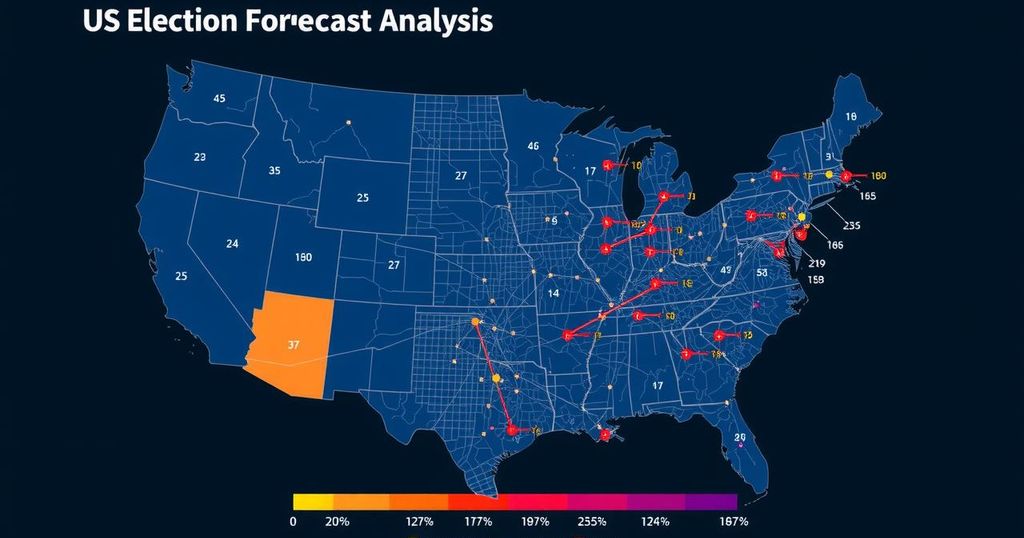Predictions for the 2024 U.S. Presidential Election: Insights from Forecasters
The 2024 U.S. presidential election is tightly contested between Vice President Kamala Harris and former President Donald Trump, with several forecasters offering differing predictions. Allan Lichtman predicts a victory for Harris based on historical models, while Nate Silver acknowledges the toss-up nature of the race with his instinct leaning towards Trump. Other analysts, including Christophe Barraud and Thomas Miller, foresee a Trump win based on economic conditions and betting markets. Larry Sabato’s evaluation suggests no clear winner at this time, indicating significant uncertainties as election day approaches.
As the 2024 United States presidential election approaches, the race appears incredibly competitive, with Vice President Kamala Harris and former President Donald Trump locked in a tight contest. Polling data indicates a near-even split between the two candidates across critical swing states, pointing to an uncertain electoral landscape. Experts and forecasters offer varying predictions about the potential outcome of the election, relying on an array of analytical models and methodologies. Historian Allan Lichtman employs a unique approach known as “The Keys to the White House,” consisting of 13 true/false statements that evaluate various indicators, including economic conditions and foreign policy. Lichtman has predicted that Harris will win the election, although he acknowledged the complex nature of assessing foreign policy impacts amid the ongoing conflicts in Ukraine and the Middle East. Nate Silver, a noted statistician and founder of FiveThirtyEight, states in an opinion piece that while his instinct leans toward Trump, his official forecast indicates the race is highly competitive, describing it as a genuine toss-up. He emphasizes that a prediction of 50-50 truly reflects uncertainty. French economist Christophe Barraud, recognized for his accuracy in forecasting, anticipates a Trump victory, projecting a Republican sweep of both the Senate and potentially the House of Representatives. Data scientist Thomas Miller takes a different tack by analyzing betting markets instead of traditional polls. He has witnessed shifts in his forecasts, initially favoring Harris but now indicating a significant lead for Trump, predicting up to 345 Electoral College votes for the Republican candidate. Larry Sabato, a respected political scientist and the editor of Sabato’s Crystal Ball, has found that his projections do not favor either candidate definitively at this moment. His ratings suggest a distribution of 226 votes for Harris and 219 for Trump, with a significant number of votes classified as toss-ups. As election day draws closer, the diverse predictions from these experts underscore the volatility and unpredictability of the electoral process. These insights reflect the myriad factors influencing voter sentiment and the potential for late changes in the voting landscape.
The 2024 United States presidential election is rapidly approaching, creating a high-stakes environment as candidates prepare for the final electoral race. With numerous indicators, including national and swing-state polls, providing insights into voter preferences, analysts and forecasters have stepped in to offer their predictions. Several experts, utilizing different methodologies—ranging from historical models, economic data, to betting markets—attempt to forecast the election’s outcome. Understanding their approaches and conclusions is essential for grasping the potential trajectory of the election.
In summary, the race for the White House in 2024 remains exceedingly tight, with predictions reflecting a spectrum of possibilities. Allan Lichtman forecasts a Harris victory through his historical model, while Nate Silver presents a contrasting perspective that sees the race as a toss-up. Christophe Barraud and Thomas Miller depict Trump as the likely victor, albeit through different analytical lenses—economic data and betting markets, respectively. Larry Sabato offers no definitive victor, indicating a deadlock in Electoral College projections. As these forecasts illustrate, the dynamic nature of voter sentiment and external factors will play a crucial role in determining the ultimate outcome of the election.
Original Source: www.newsweek.com




Post Comment